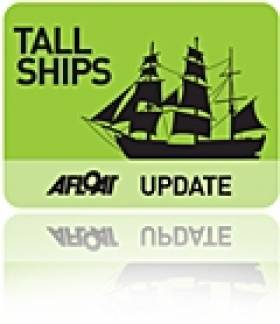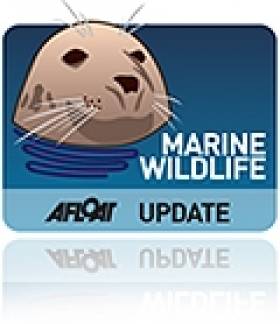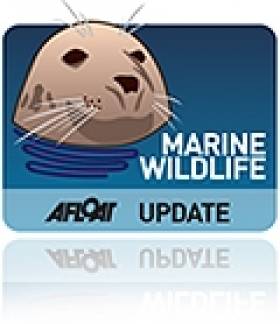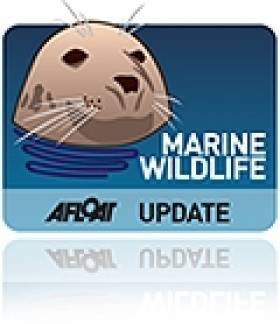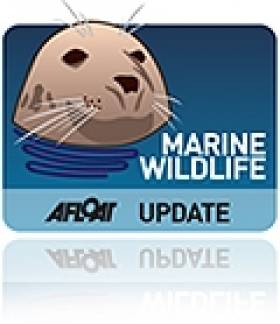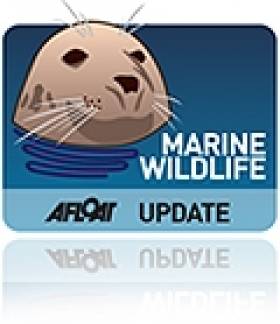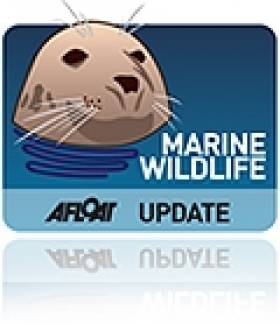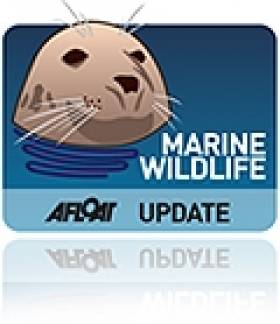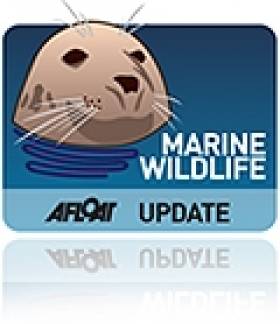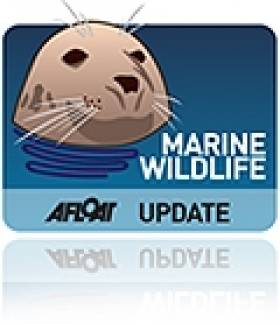Displaying items by tag: Irish Whale and Dolphin Group
IWDG Secures 75% Funding for Celtic Mist Refit
#TALL SHIPS - The Irish Whale and Dolphin Group (IWDG) has secured three-quarters of the funding it required to refit its research vessel Celtic Mist.
According to The Irish Times, the Clare Local Development Company has approved the allocation of a €48,000 grant towards the refurbishment of the ketch.
The work will be carried out by Cathal Blunnie and several sub-contractors, and involves stripping down the main cabin and removing the bath and shower to increase space for crew berths.
While the ship's clock will be retained, the ship’s wheel in the main cabin will be removed and presented to the Haughey family as a gesture of appreciation.
As previously reported on Afloat.ie, the 52-foot yacht - which was gifted by the Haughey family to the IWDG to assist in its marine wildlife conservation work - entered dry dock last November in preparation for the refit work, after relocating to its new berth at Kilrush, Co Clare in July.
This followed its last jaunt at sea in its former guise, completing a leg of the Tall Ships Races from Waterford to Greenock in Scotland.
The cost of refurbishing the yacht for research and training purposes is expected to top €60,000, with an annual running cost of some €20,000, for which the IWDG is seeking ongoing financial assistance.
The group aims to get the Celtic Mist back at sea before the summer.
First Humpback Whale Sighting of 2012 Is a Newcomer
#MARINE WILDLIFE - Ireland's first humpback whale of the year has been spotted off the Wexford coast.
The sighting was made yesterday by whale-watchers among a pod of fin whales some three miles south of Hook Head, according to TheJournal.ie.
The Irish Whale and Dolphin Group (IWDG) has also confirmed that the humpback is a new sighting in Irish waters, and has been designated the reference HBIRL18.
RTÉ News has images of the humpback whale HERE.
IWDG to Host European Cetacean Conference in Galway This March
#MARINE WILDLIFE - The Irish Whale and Dolphin Group (IWDG) will host the 26th annual European Cetacean Society Conference in Galway on the weekend of 24-25 March this year.
The Galway Bay Hotel will be the site for the main conference sessions, while workshops will also be held at the Galway-Mayo Institute of Technology (GMIT).
This year's gathering is being held under the theme 'Communication: Information and Ideas Worth Sharing'. Participants will be exploring communication between marine mammals as well as between marine scientists, and between scientists and the public.
As Ireland's Wildlife reports, the conference "offers a offers a great opportunity to find out more about whales and dolphins, their conservation, the cetacean research being carried out in Europe and to meet the researchers who are working to uncover the mysteries of these most enigmatic of creatures."
Registration is now open for the two-day event. For full details of the conference programme, venues and booking information, visit the European Cetacean Society Conference micro site HERE.
Fin Whale 'Feeding Frenzy' Off Hook Head
#MARINE WILDLIFE - A "feeding frenzy" involving a pod of fin whales was spotted off Hook Head in Co Wexford last week, The Irish Times reports.
And according to Andrew Malcolm of the Irish Whale and Dolphin Group (IWDG), two of the whales were in the same location almost exactly a year ago.
Malcolm, who was with a group on board the Rebecca C, used photographs of the whale's dorsal fins to compare records for the confirmation.
The pod of six fin whales was seen feeding some 3km southeast of Hook Head, attracted by the herring spawning grounds in the area.
More than 30 other cetaceans, including common dolphins, porpoises and a minke whale, were sighted on the trip.
The Irish Times has more on the story HERE.
Omey Island Whale Buried at Sea
#MARINE WILDLIFE - The Irish Times reports that the sperm whale that was stranded in Connemara at the end of last year has been buried at sea.
The 13-metre whale carcass has attracted thousands of onlookers to Omey Island in Co Galway.
As previously reported on Afloat.ie, the sperm whale was found beached with a broken lower jaw and shed of its skin.
The whale carcass was towed out to sea west of High Island on Thursday after being deemed too large to bury on land.
"Chances are it died offshore and got washed in with the wind," said Dr Simon Berrow of the Irish Whale and Dolphin Group (IWDG).
The IWDG added that such strandings were relatively common, although as reported on Afloat.ie last year there has been growing concern over the rising number of dolphin deaths along the south coast in particular.
Record Year for Whale and Dolphin Strandings
#MARINE WILDLIFE - The Irish Whale and Dolphin Group (IWDG) says 2011 was a record year for whale and dolphin strandings, according to The Irish Times.
IWDG co-ordinator Dr Simon Berrow confirmed a total of 160 strandings reported by year's end.
"This is by far the highest total for the number of stranding records and the third highest total for sighting records since the IWDG recording schemes were established in 1991," he said.
The 2011 record compares to a figure of 92 stranded cetaceans in 2010 - a number much lower than previous years.
Dr Berrow explained to BBC News: "The figures for 2010 were very low, and, we think, this was due to the easterly winds that year. But now we are back up to the kind of level we expect."
Stranding records in 2011 were characterised by a very high peak of common dolphin strandings during February and a high number of porpoise strandings during the winter.
Meanwhile, Dr Berrow considered the latest sightings record "very impressive" given the exceptionally poor sea conditions during autumn and winter.
More than 1,500 whale and dolphin sightings were made in 2011 around the entire coastline of Ireland despite the bad weather.
Whales, Dolphin Found Beached on West Coast
#MARINE WILDLIFE - Three whales and a dolphin were found beached over the past few days along Ireland's west coast, according to the Belfast Telegraph.
Dr Simon Berrow of the Irish Whale and Dolphin Group confirmed that reports had been received of a bottlenose whale on White Strand in Co Clare, a pilot whale on Fintra Beach in Co Donegal and a dolphin in Silverstrand, Co Galway - all found dead.
The latest find was a male sperm whale stranded on Omey Island in Co Galway, shed of its skin and with a broken lower jaw.
"Chances are it died offshore and got washed in with the wind," said Berrow.
The IWDG said such strandings were relatively common, although as reported on Afloat.ie earlier this year there has been growing concern over the rising number of dolphin deaths along the south coast in particular.
Bottlenose Dolphin Pod Seen Again Off Dublin Coast
#MARINE WILDLIFE - They were thought to have disappeared from the east coast in October after delighting wildlife enthusiasts in Dublin and Wicklow.
But concerns that one of the group had died were swept side when the pod of three bottlenose dolphins was once again spotted off Killiney recently.
The Wicklow People reports that the two adults and one juvenile reappeared almost two weeks ago, and have been seen daily "putting on great displays of leaping, breaching, and tail slapping".
Fears were that tragedy had befallen the group when two bottlenoses were seen off Skerries and Balbriggan in late October, and a juvenile was found dead in Portmarnock shortly after.
As previously reported on Afloat.ie, some 200 sightings of the dolphins between Dalkey Island and Wicklow town in recent months were validated by the Irish Whale and Dolphin Group (IWDG).
According to the IWDG, evidence suggests that the pod is now resident off the east coast.
The Wicklow People has more on the story HERE.
Second Fin Whale Stranding for Sligo
#MARINE WILDLIFE - Sligo County Council is considering its options for disposal after the county's second whale stranding of the winter, when a 60ft male fin whale was beached at Agharrow.
A spokesperson told the Sligo Champion that the whale was in an area known locally as Staid Abbey, lying on a smooth rock ledge that slopes down towards the sea, and is a difficult point to access - particularly in the present stormy conditions.
As previously reported on Afloat.ie, a whale carcass was washed up at the end of last month not far from Agharrow at Raughley. The Irish Whale and Dolphin Group (IWDG) has confirmed that this was the first validated stranding recorded of a fin whale in Co Sligo.
That whale had its flesh removed for fertiliser, while its bones were studied by PhD students from NUI Galway ahead of being buried in a nearby field to allow for the natural decomposition of remaining flesh before future preservation.
Fin Whales Could Be Wexford Bound
#MARINE WILDLIFE - The Enniscorthy Guardian reports that the fin whales that have been sighted off Tramore in recent weeks may soon make their way towards the Wexford coast.
Afloat.ie recently reported that Waterford was the 'best place to be' for whale watching, with the Irish Whale and Dolphin Group (IWDG) confirming fin whale sightings along a 20-mile stretch from Stradbally to Brownstone Head.
Cetacean fans are being advised to keep an eye on the coast from Hook Head to Brownstown headland to catch a glimpse of the fins, which are renowned for their six-foot whale blow.
Whale watchers are also urged to report any sightings to the IWDG online at www.iwdg.ie to help keep its database up to date.



























